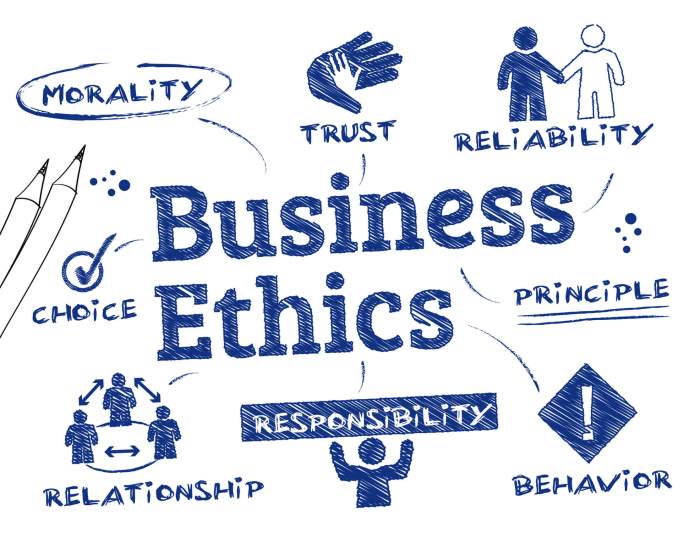Business ethics takes center stage in this cool exploration of moral standards and decision-making in the business realm, giving you a peek into the world of ethical leadership and corporate responsibility. Get ready to dive into a world where doing the right thing is the ultimate rule of the game.
Introduction to Business Ethics

Business ethics refers to the moral principles and values that guide the behavior of individuals and organizations in the business world. It is essential for companies to uphold ethical standards to build trust with stakeholders, maintain a positive reputation, and ensure long-term success.
Role of Business Ethics in Decision-Making
Business ethics play a crucial role in decision-making processes within organizations. Ethical considerations help leaders and employees make choices that are fair, transparent, and aligned with the values of the company. By prioritizing ethics in decision-making, businesses can avoid legal issues, protect their brand image, and foster a culture of integrity.
- Ensuring fair treatment of employees and customers
- Preventing conflicts of interest
- Complying with laws and regulations
- Being honest and transparent in communication
Examples of Ethical and Unethical Behavior, Business ethics
Ethical behavior: A company donating a portion of its profits to charitable causes.
Unethical behavior: Falsifying financial reports to mislead investors.
Business ethics can guide individuals and organizations to make decisions that benefit not only their bottom line but also society as a whole. It is a fundamental aspect of corporate governance and responsible business practices.
Ethical Theories in Business
In the field of business ethics, various ethical theories serve as frameworks for guiding decision-making processes. These theories include deontology, consequentialism, and virtue ethics, each offering a unique perspective on what constitutes ethical behavior in a business setting.
Deontology
Deontology is an ethical theory that focuses on the inherent rightness or wrongness of actions themselves, rather than the outcomes or consequences of those actions. In business scenarios, a deontological approach would prioritize following ethical rules and principles, regardless of the potential benefits or harms that may result.
Consequentialism
Consequentialism, on the other hand, evaluates the morality of an action based on its outcomes or consequences. In a business context, this theory would emphasize maximizing positive outcomes or utility while minimizing negative consequences. This approach often involves weighing the risks and benefits of various courses of action to determine the most ethical choice.
Virtue Ethics
Virtue ethics focuses on the character and moral integrity of individuals, emphasizing the development of virtuous traits such as honesty, integrity, and compassion. In business, this theory encourages cultivating a corporate culture that values ethical behavior and promotes the growth of virtuous qualities among employees and leaders.
Each ethical theory has distinct implications for organizational behavior and decision-making in business. Deontology emphasizes the importance of following ethical principles and rules, regardless of the outcomes. Consequentialism prioritizes achieving positive consequences while minimizing negative impacts. Virtue ethics underscores the significance of fostering virtuous character traits within the organization to promote ethical behavior.
By analyzing and understanding these ethical theories, businesses can navigate complex ethical dilemmas and make informed decisions that align with their values and principles.
Corporate Social Responsibility (CSR): Business Ethics
Corporate Social Responsibility (CSR) is a business approach that aims to contribute positively to society while also ensuring the company operates ethically. In today’s business environment, CSR has become increasingly important as consumers and stakeholders are more conscious of the impact that companies have on the world.
Significance of CSR in Today’s Business Environment
CSR initiatives play a crucial role in shaping a company’s reputation and bottom line. By engaging in socially responsible practices, companies can build trust with their customers, attract top talent, and enhance their brand image. Moreover, CSR can lead to cost savings through improved efficiency and risk management.
- Enhancing Brand Reputation: Companies that are committed to CSR are viewed more favorably by consumers, leading to increased loyalty and positive word-of-mouth.
- Attracting Top Talent: Employees are increasingly seeking employers who prioritize social and environmental responsibility, making CSR a valuable tool for recruitment and retention.
- Improving Financial Performance: CSR initiatives can lead to long-term profitability by reducing operational costs, mitigating risks, and attracting investment.
Examples of Successful CSR Programs
Some companies have implemented successful CSR programs that have had a positive impact on society. One notable example is Patagonia, a clothing company known for its commitment to environmental sustainability. Patagonia’s CSR initiatives include using recycled materials in their products, promoting fair labor practices, and donating a portion of their profits to environmental causes.
Another example is Microsoft, which has made significant investments in education and technology access for underserved communities through its CSR programs. By providing resources and training to disadvantaged groups, Microsoft has been able to create positive social change while also enhancing its reputation as a socially responsible company.
Overall, CSR is not only beneficial for society but also essential for companies looking to thrive in today’s business landscape. By integrating CSR into their core business strategies, companies can make a meaningful impact on the world while also driving sustainable growth and success.
Ethical Leadership

An ethical leader is someone who demonstrates honesty, integrity, and fairness in their decision-making process. They lead by example, setting high ethical standards for themselves and others to follow. Ethical leaders prioritize the well-being of their employees and the community over personal gain or profit.
Characteristics of an Ethical Leader
- Integrity: Ethical leaders act consistently with their values and principles.
- Transparency: They communicate openly and honestly with their team members.
- Empathy: Ethical leaders understand and consider the feelings and perspectives of others.
- Accountability: They take responsibility for their actions and decisions.
Impact of Ethical Leadership on Organizational Culture
An ethical leader can positively influence the organizational culture by fostering a sense of trust, respect, and collaboration among employees. When employees see their leaders acting ethically, they are more likely to follow suit, creating a culture of integrity and accountability within the company.
Importance of Ethical Leadership in Fostering Trust and Loyalty
Ethical leadership is crucial in building trust and loyalty among employees. When employees trust their leaders to make ethical decisions, they are more likely to feel valued and respected in the workplace. This sense of trust and loyalty can lead to higher employee morale, increased productivity, and lower turnover rates.
Ethical Leadership for Long-Term Success
Ethical leadership is essential for driving long-term success and sustainability for businesses. By prioritizing ethical values and principles, leaders can build a positive reputation for their company, attract top talent, and retain customers. Ethical leadership also helps businesses navigate challenges and crises with integrity, ultimately leading to long-term growth and profitability.